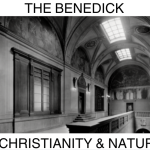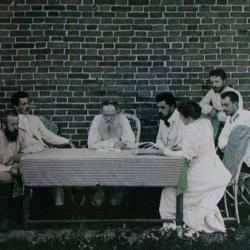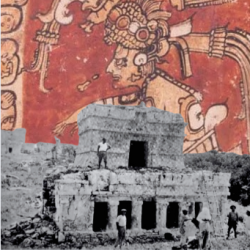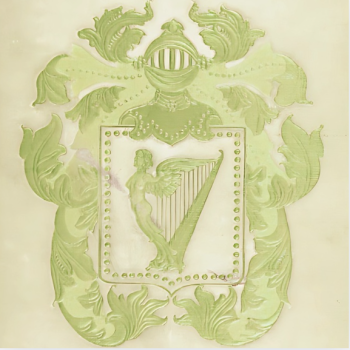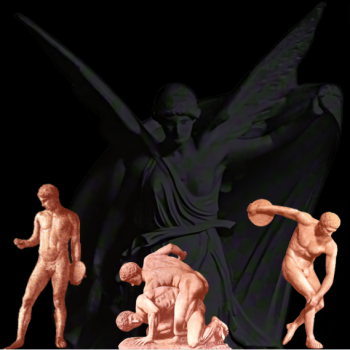EVOLUTION AND ETHICS.
December, 1906.
This meeting likely occurred on December 19, 1906, a week prior to the meeting of the American Philosophical Association on December 26, 1906.
⸻
“In the discussion following Percy’s talk at our last meeting,” said Mitchell, “the question arose as to the propriety of attributing any moral element to nature. Man finds within his own heart certain ethical standards and moral ideals. Are these only the expression in him of a moral law acting throughout all the universe? Or does their presence in man serve to differentiate him from the rest of nature, and set him, as a moral being, in opposition to natural law and natural forces, to play a lone hand for his own ideals?
“Each of these views found its advocates; as did many intermediate shades of opinion. Of these latter, one of the most interesting and suggestive was put forward by Crampton. He stated that, as a zoologist, he was forced to view nature as cruel and wasteful, and that he could see no conformity to moral ideals in its processes. Yet, while thus advocating the essential immorality of natural conditions, he asserted that our moral ideals were themselves but the evolutionary derivatives of biological principles. As the tenor of the discussion did not then admit of the elaboration of this latter theory or the attempt to reconcile the two statements, which I confess seem to me inconsistent, I have asked him to start our discussion this evening by giving us the logical development of his doctrine, and to trace for us the origin and evolution of our ethical concepts from the biological standpoint.”
“I think Henry is putting a rather doubtful construction upon one part of what I said,” Crampton stated, “and that the antithesis he mentions does not really exist in my view. It will, however, probably be more fruitful not to attempt a retrospective explanation of what I did or did not say, but to speak afresh directly to the subject given me. This subject may be stated as the ‘Natural History of Ethics.’ That is, the nature of human ideas of right and wrong as clarified by the evolutionary development of these ideas. Really there are two subjects or subdivisions of the whole problem. The first is the historical justification of human standards. The second is the relation of ‘natural’ or ‘biological’ ethics to the other elements that enter into the modern complex—religion. Here I would have to trespass upon the territory of the anthropologists, of Farrand, and others.”
“I do not think that any of us need fear trespassing upon the ground of others,” said Mitchell. “Indeed, our points of view are so different that trespass is almost impossible, however much we may talk upon the same theme. So I trust you will not let this restrict your presentation.”
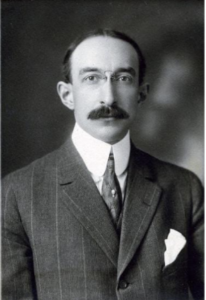
Henry Edward Crampton.
“Thank you,” said Crampton, “but I may find I have quite enough to do, to develop my first heading. A living thing, as long as it remains, or exists as a living thing, must maintain certain definite relations to the environment. It is ‘conditioned’ very definitely by external nature. For example, let us consider the amoeba, a tiny little mass of living matter, consisting of but a single cell and nearly as primitive as any living thing can be. Yet it must, to exist, provide for the introduction into itself of (a) matter, for the repair of its substance; and (b) energy, with the matter, to be converted into its ‘vital’ energy. That is to say, it must, if it is to exist, look after its immediate individual welfare, be egoistic. This is the first and great commandment of Nature, by which the most primitive as well as the highest forms of life are conditioned: ‘preserve thyself.’
“A second commandment of Nature is: ‘perpetuate thyself.’ Whatever may be the cause of reproduction—and Biology offers some very definite statements on this subject—the conditions are such that an individual of a species must make more like itself. Nature does not tolerate any forms that ignore their ‘duty’ to the species—individualism is not permitted to reach its logical extreme. And often the obedience to Nature’s second mandate runs directly counter to individual interests. Nevertheless, there are now no species that place individual before racial welfare. For if such there were at any time, these have died as species. Nature does not approve of ‘race-suicide.’
“Thus at the very beginnings of life, as in its most complex forms, we see these two laws ruthlessly enforced—‘preserve thyself’ and ‘preserve thy kind.’ The violation of either entails the blotting out of the form that disobeys. But already we see evidence of the wider end dominating the narrower, the preservation of the race taking precedence over the preservation of the individual.
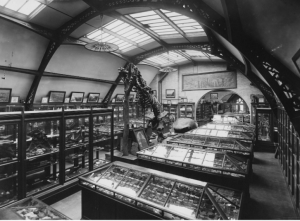
Columbia College Vertebrate Museum. (New York Historical Society.)
“When, now, we pass to such an organism as the Hydra, the small fresh-water polyp, a relative of the jelly-fish and coral, we find, not one cell, but a large number of these little organic units, arranged in two layers;—an outer layer, lined by an inner one. Here we have a new cell environment and in consequence a new type of ‘conditioned’ existence. Each cell must maintain itself. But there is something more that the cells must do. They must work not only for themselves but for their fellows, and their fellows in turn must work for them.
“The outer cells provide for the relating of the whole mass of cells to the environment. In return for this they are relieved of the feeding functions, as they receive supplies from the inner layer, that feeds not only for itself but also for the outer protective layer. Thus we have a primitive community, composed, so to speak, of two groups or castes, a soldier class and an agricultural class, while of course there are those cell units that have as their special task the reproduction or perpetuation of the whole colony.
“Thus no cell is entirely sufficient unto itself. It must, it is true, carry on the same essential vital activities as a solitary amoeba. But now, it also owes a duty to the other members of its colony, who, in turn, are specialized for other tasks and owe duties to it. Interdependence of differentiated units replaces the independent egoism of solitary forms. Altruism is a direct result of association and differentiation.
“From this brief sketch two things should be clear: First, how an individuality of an higher order is established by the union and specialization of first order individuals. And, second, what ‘duties’ of mutual support and cooperation are imposed upon the primary units by such social relations. Let us now extend our view to higher groups, and consider such communities as are formed by wolves, or ants, bees, wasps, and the like.
“Here, as in the case of the cells in the polyp, we see the same mutual dependence or interdependence of units, the same subordination of the individual to the common good in which all must share. A pack of wolves will hunt as a unit, and pull down together what one would be powerless to overcome. The welfare of each depends upon the welfare of the whole. No matter how well fed and strong a single wolf may be, if his pack is feeble and diminished he is himself in danger. It pays to share the kill; and that pack whose members put aside their personal quarrels on the chase will survive in competition with those who do not. To care for one’s fellow, to love one’s neighbor as oneself, is a commandment founded upon biological efficiency. It does not contradict, but both supplements and is necessary to, the other commandment of self-preservation.
“Yet there are times when these two commandments conflict, when the preservation of the community demands the sacrifice of the individual. Here the lower orders of nature present us with most striking instances of altruism and self-sacrifice. Consider, for example, the life of the royal bee. You all know how the life of the hive centers around its queen, who lays all the eggs, and upon whom thus rests the perpetuation of the entire colony. There cannot be two queens in a single hive—if there are, civil war results and one or the other is killed. Yet ‘princess’ bees must be raised, both to guard against the hive being left through accident without a queen, and also to lead the swarms and to furnish queens to the new hives. Here then would be a danger of internal dissension and strife were it not that the princess bees provide for their own death. The royal larvae construct only imperfect cocoons, leaving open a space where they may be stung to death if unneeded. In a way it is suicide. But it is the same kind of suicide that the soldier commits in storming a battery, going himself to certain death that others may survive—or that a union may endure.
“Human society is no less an organism than is a pack of wolves or a hive of bees. There is among men today the same specialization and differentiation of task and power and function as we saw among the cells of the simple hydra. Men are not independent, but interdependent; and the laws of the biological efficiency of organisms apply to our civilizations, as to our bodies. We have seen that these laws require of the individual two things—the discharge of two kinds of duties, the one egoistic, the other altruistic;—he must provide for his own welfare and for the welfare of his fellows. And if these two clash, his duty to himself and his duty to the whole of which he is a part, then the wider end takes precedence over the narrower.
“This is, in briefest outline, what I believe to be the ‘historical justification of our human standards.’ It does not matter at all whether the wolf and the bee act as they do consciously or unconsciously; whether generosity and self-sacrifice with them be blind and compelled, or deliberate and willed; the point that is of importance is this: those forms of life which obey these laws survive; those that disobey die. And this has been as true of men as of animals. The savage may not have seen why he should do this and avoid that, but the fact remains that only those tribes survived who consciously or unconsciously obeyed these mandates of Nature. Our ethical standards are what they are because of this fact. They are in every way similar to all other evolutionary characteristics.
“From this view it will be seen that many of our human terms receive very precise definition. Right is what furthers both individual interests and the interests of the whole group. Wrong is the reverse. Good is what is useful. Evil is that which interferes with the discharge of personal or social functions.
“Let me now turn for a moment to my second heading and consider the relation of this natural system of ethics to the other elements that enter into the religious complex. As a result of the causes I have attempted to outline, primitive man finds himself with certain feelings of compulsion toward this or that course,—often toward a self-sacrifice he cannot explain on rational and immediate grounds. He is living under tribal order and law, and the compulsion he is familiar with is the power and authority of his chief—enforced with club and spear. Therefore it is natural for him to ascribe this inner instinct to some external authority—the will of some god or spirit chief.
“I think that we can even see how he comes by this latter idea. For in dreams he sees his friends and enemies, and talks and acts with them. Thus he is led to a belief in another world than the outer one around him. Moreover, he still sees in dreams those who have died, and thus he is led to think of their continued existence. From this the idea of disembodied spirits and of immortality is formed. Thence the path is plain, and all natural forces, as well as all that happens to the man himself, are viewed as the activity of some one or other of these spirit chiefs and heroes. Gradually greater and greater power is ascribed to them. As man moulds ships, so the gods mould mountains, send rain and drought at will, and play with lightning and with storm, until finally the notion of an omnipotent God, as well as an omniscient one, completes the series.”
“Is not this a pretty cold view of life?” asked Griscom.
“It does not matter whether it is cold or not, provided it is true.” Crampton replied.
“Many things are true,” said Griscom, “yet none contains all the truth. What I mean to ask is this: Suppose we grant you all that you have said, what follows? In what way does this bear upon religion? Have you in it a view of life which satisfies you, or which helps you to live?”
“Yes, I have,” said Crampton. “I suppose to some it would seem cold, but to me it is sufficient. If I find the basis for my conduct and ethical ideals in the very laws of life, what is surer or more fundamental? If it is not a religious view in the usual sense it certainly arouses in me that cosmic emotion which I put forward as the basis of religion. Indeed, that is just what I tried to make clear: that these were the facts which it seemed to me did underlie first ethics and then religion.”
“Let us then look again at certain of their implications,” said Mitchell. “As I understood you, you began by considering the life of the single cell, which acted as though subject to but two desires: self-preservation and the preservation of its kind, which last you spoke of as being in one form or another really an act of self-sacrifice. From this you passed to a consideration of more complex organisms, such as the jelly-fish. Here you showed that while each component cell carried on its own life, it still so coordinated itself to its fellows and to the whole of which it is a part that the higher single life of this whole became possible. This coordination you showed to be at once egoistic and altruistic in character, and you put it forward as the basis of our present ethical ideals, tracing its action through the communities of insects and animals to primitive and civilized man.
“Now I would like to ask a question,” continued Mitchell. “Is it a legitimate inference that, as the coordination of the cells of the jelly-fish enabled each to live with the richer, fuller life of the whole, so obedience to ethical standards would lead man to a higher, wider type of consciousness and existence than that of his present separate personality? Does not your argument suggest that man is part of a far greater whole; that ethics and religion coordinate him with that whole and should enable him to broaden and deepen his life and consciousness until it is one with that higher consciousness of which his is but an element?”
“We must remember, however, that there can be nothing to this higher complex that is not in the elements themselves,” Crampton replied.
“Surely you do not mean that,” said Johnston. “The combinations of elements may be totally different from any one of the constituent parts.”
“Certainly,” said Crampton. “All I said was that this whole was compounded from the elements. Whatever the whole is must be made up from something in the elements.”
“But is even that certain?” Montague asked. “May not the properties of a whole be quite distinct from the properties of its parts, even when taken together?”
“Bolzano’s example of a drinking glass would illustrate,” said Mitchell. “Viewed as a whole we perceive it holds water. Conceive it as a collection of broken parts and no such inference is plain.”
“I am quite willing to take your illustration as my own,” Crampton replied. “A drinking glass can only be formed from elements capable of being so placed together that there are no gaps. This is a property which must be present in the element, namely: that they fit one into the other; though you will notice that this is a meaningless characteristic when a single element is alone considered. Anything that is not in some way in the elements themselves can be no more than a mere abstraction.”
“How about the water itself?” Montague asked. “Its characteristic property of wetness is absent from both the hydrogen and oxygen which form it . Or, better still, consider a clock and the ability to tell time. Surely time is not a mere abstraction. Yet you will not find it compounded from the brass and steel. Again, to take Henry’s point, are we not all familiar with the difference between mass psychology and that of the individual? Consider the way in which a mob is moved to frenzy—to panic or to rage, or any emotional excitement. Think of the mob ferocity; the lynchings, the burnings, the torturings, which are nothing but the manifestations of this mob frenzy, while the individuals comprising it may be of themselves quite mild mannered quiet people. These are not mere abstractions.”
“Is it not probable,” said Griscom, “that to each individual amoeba the jelly-fish is a mere abstraction?”
“I would contend that aqueosity is in fact a property already present in the hydrogen and oxygen, and certainly everything that is done in a lynching is done by individuals,” said Crampton. “In that sense the mob is a mere abstraction. The coming together of many men and their reaction one upon the other bring out what would otherwise not have been revealed. But it was there, nevertheless. Indeed, I think this is a matter of considerable importance, too often overlooked. Whatever is present in the highest organism must also have been present, and always present, in element, in the cells which compose it. The continuity of the germ plasm makes this certain.”
“You mean?—” asked Mitchell.
“I mean ‘ex nihilo nihil fit,’” replied Crampton. “Moreover, acquired characteristics are not transmitted. You do not inherit from your father, but from that common line of life which made him what he is first, and then you what you are. ‘Natural selection’ and other such evolutionary factors do not create, they eliminate. They are the judges of what forms shall endure. They do not produce those forms. Therefore we are forced to view all forms as present in some way in the cells from which they spring.”
“Present they doubtless are,” said Mitchell, “but still unrealized and unmanifest—present as potentialities—and evolution would appear to be the layer by layer unfoldment of their content. But does not this still further point my question? If all forms of life are pre-existent as potentialities in the single cell, then man must also be the image of the universe, contain within himself all the powers of the whole, present and realizable though unrealized. And you have shown us that at least certain of these possibilities can be manifested, new and higher forms of life realized, by such a coordination as you have said ethics and religion in fact are. In this view, then, ethics would appear as something more than preservative. It would be itself a dynamic principle—the actual machinery of growth. Do we not, in this, return very close to Percy’s definition of religion as ‘the climbing instinct,’ whereby the consciousness and life of man is constantly being widened and raised?”
“In a way I think we do,” said Crampton, “but I would prefer to say that we become more efficient, than that our consciousness is raised. I do not know that the wolf in the pack has a different, or higher type, of consciousness than the one who hunts alone.”
“But why talk about wolves and bees?” asked Grant. “Surely we know more of ourselves than we do of amoebas and wolves. And is it not—well, let us say a humorous conceit to argue seriously that religion is or is not creative because a lone wolf acts about as his brothers in a pack do? Have we not difficulties enough when we begin with and confine ourselves to man?”
“It is precisely because we have so many difficulties when we do confine ourselves to man that it becomes necessary for us to take a broader view,” said Crampton. “And I do not at all agree with you that we know more of ourselves than of lower orders of life. There is nothing more misleading than introspection, as current religious psychology amply demonstrates.”
“I agree with Percy,” said Woodbridge. “Personally I can see better in a lighted room than in the dark. My own mind is lit for me, the mind of a wolf is not.”
“Is it not wise to look in both directions,” asked Mitchell. “Both inward at our own hearts and minds, and outward upon the workings of nature? These two views seem to me to supplement and correct each other. Thus, though I am inclined to think our zoologists are too materialistic in their conception of life and of heredity, taking too little account of the enormous influence of mental and moral environment, which is in fact a moral heredity, it seems to me there is a grandeur and a universality in the view Crampton has just presented which I would be sorry to lose. Does it not both enrich and clarify our ordinary thought of ethical standards to see them as at once evolutionary products and evolutionary forces? To view them as the deposit in the consciousness of long ages of experience? Think thus of Nature sifting the hearts of her children, breeding brotherhood in us as we breed horses for speed or wind. We may not see why we should act thus or so, why we should feel this right and that wrong. Hereditary tendencies are rarely reasoned, and the deeper any principle is ingrained in our character the less obvious is its cause. The explanation of our ethical standards cannot be found in any immediate benefit, in any cheap clap-trap of honesty being the best policy. They would never have been produced by the conditions of a given moment, nor can they find their sanction in the present. Their causes extend back into the past to the origin of life itself. Their production required the age long integration of successive lives, their justification and their end must ever be beyond us. They are the past acting in us, the present also moulding the time and forms that are to be. They are the will of nature, the evolutionary stream itself, the breath of life. This is what I conceive Crampton’s presentation to mean, and it seems to me to contain elements we cannot well do without. But after all it is only half the story, and I would wish with Percy to look at these things directly as we find them in our own hearts. Unreasoned they may there be, but they are not fruitless there. And we do not need to speculate upon their fruit. We can one and all know of our own experience the enrichment that results from altruism and unselfish effort. Indeed, I believe we can know it in no other manner. So there surely I think it more profitable to study ourselves than ‘our brothers the wolves.’”
“It seems to me the study of external nature simply emphasizes the fact that we can only find ethics and religious ideals in our own hearts,” said Montague. “I fail entirely to see this moral element in nature of which you talk so much. You seem to me almost deliberately to distort the facts. Because two thugs can kill and rob more safely and lucratively working together than alone, the law does not, on that account, sanctify their partnership. Yet you are presenting such a conspiracy of murder as a marvelous example of natural religion among the wolves. As for the heroic suicide of the princess bees, as well look upon little Prince Arthur’s murder by John Lackland as suicide, because of Arthur’s supreme self-sacrifice in being young and helpless. Your beehive is about as healthful a place for supernumerary royal heirs as is the harem of the Sultan of Turkey—and for a like reason. But I do not remember to have heard this infant mortality lauded as a peculiarly moral and uplifting circumstance designed to inculcate religious truths and divine ideals of mercy and justice. It is really time you biologists began to do some clear thinking. Why can you not be content to look at life directly, and courageously accept man’s splendid isolation as a moral being? Why must you creep and crawl and seek a false support in nature where it can not be found? Is it not far more splendid to follow our ideals because they are ours, than thus to endeavor to bolster them up by external props?”
“I do not think it is Crampton who should be accused of hazy thinking because you have drawn these inferences from what he has said,” said Calkins. “His thesis shows that we are what we are as the result of natural processes—and his argument accounts for the cruelty and selfishness in us as well as for the altruism. It is exactly as easy to deduce the one as the other from the first biological principle of self-preservation. When this is directed to the preservation of the individual we have selfishness, when to the preservation of the common-life stream, of which the individual is an expression, we have altruism. Neither seems to me the basis of religion. But as for ‘man’s splendid isolation as a moral being’ I have not an idea what those words mean. Have you?”
“It seems to me that Crampton’s point is a rather subtile one,” said Mitchell, “and what he has said tonight should in justice be taken in connection with the views expressed at our last meeting. He is not arguing for nature’s morality, but is tracing the evolution and growth of man’s ethical sentiment and standards from biological principles. We are in danger of forgetting again that man is not outside but in the universe and his ideals are thus of necessity factors and powers in the universe, which, however small or large, must be taken into account, and must have a cause, and origin, and connection with other factors. This seems to me the great value of the scientific and biological view of man—that it emphasizes his oneness with other forms of life. Yet I have confessed to thinking it only half the picture, and to viewing the action of external nature more as corrective than creative. However, it is not my ideas that are now in question, and perhaps Woodbridge will tell us where he gets his ideals if they are not bred in him by life itself.”
“From my own soul,” Woodbridge replied.
“But where did your soul get them?” asked Grant.
“From God, if you like,” said Woodbridge. “But I want to go back once more to the very basis of this biological view. What right have you to speak of the tendency to self-preservation as the fundamental or first law of biology? Is that not an exploded theory? It has long since been abandoned in psychology and the tendency to, or law of, self-satisfaction has been substituted for it. Is it not time that biology should abandon such an outworn postulate, that so obviously says either too much or too little according to the place in the scale of evolution to which you are applying it? Animals, for example, are not thinking of preserving life, but of satisfying their hunger, thirst, or other wants. The moth when it flies to the flame is not seeking to preserve its life or to lose it, but solely to satisfy its desires. Again, with man, we find many things placed before the desire for self-preservation—his love of the ideal, of truth, of beauty, and the lust for it, or of duty and the austerities of religion—all these have been chosen by man deliberately before the continuance of his personal existence. And to one such deliberate choice we have a hundred unreasoned ones. Really it seems to me that self-preservation is more commonly lost sight of than remembered, and even when remembered it is treated as of little moment compared with the satisfaction of ourselves—whatever this may mean to the self and the time in question.”

Columbia College Vertebrate Museum. (New York Historical Society.)
“Yes, you can state it as self-satisfaction, if you so desire,” said Crampton, “though it is evident one cannot satisfy oneself when one has ceased to exist. Or we can give it an even more general and precise description as the necessity of reacting in the proper manner to the environment; that is, the tendency toward equilibrium, or the rectification of difference of potential, involving organism and environment.”
“That, of course, is more subtle,” said Montague, “but I do not know that it is more accurate. I doubt if the proper reaction toward the environment does always tend to rectify difference of potential. It may tend to increase, not diminish it, and I believe this is particularly the case where one is striving to follow one’s own ideals without all this kow-tow-ing to Nature. Why should we worship Nature? Great, big, clumsy, blundering thing! Caught red-handed in its idiotic incompetency! Cruel! Wasteful! Remorseless! We should curse Nature, not worship it. Or, better still, we should be snobbish to Nature. Use it and despise it.”
“It seems to me that not enough account is taken of reflection and the part it plays in this subject,” said Woodbridge. “It is as reflective beings that we are religious or irreligious, or that religion touches us at all. I follow the zoologists entirely so long as they are dealing with the lower orders of life—from which we must assume the power of reflection to be absent. Here nature rules. The organism itself acts and reacts according to completely understandable laws; as we can conceive an automaton would. It is a mechanical scheme of life, and the problems it presents are of the same order as those of physics, or chemistry, or mathematics; and the tentative solutions arrived at are about as satisfactory in the one science as in the others. All this I follow.
“I follow also the mechanical explanation of how these simple forms combine into forms more complex. I see how the dynamic principles, underlying this coordination, correspond in some fashion to certain sociological and ethical principles that unite us to our fellow-men. But none of this seems to me the basis of religion. Nor do I at all agree with the second part of Crampton’s talk.”
“You mean,” said Mitchell, “that somewhere in the evolutionary scale—perhaps with man himself—a new faculty or power comes into play, the power of reflection? And that religion is concerned with this, not with that mechanical, automatic action and reaction between the pure animal and his environment?”
“That is exactly my meaning,” said Woodbridge. “With the power of reflection comes the possibility of error, which till then did not exist—an automaton cannot be mistaken—but there comes also the possibility of a deeper and truer discernment. As reflective beings we look within our own hearts and see ideals and desires. We look out upon life around us and we see both richness of content and inexorableness of law. Seeking satisfaction we realize the universe has set down certain prescriptions, not of our making. Joyously, enthusiastically we accept them. This is to me the basis of the religious attitude.”
“And if we do not accept them?” asked Montague.
“Then your attitude toward life is not religious,” said Woodbridge. “The essence of religion is to play the game, not to dispute the rules.”
⸻
Exordium: Conscientious Clergyman.
Chapter I. The Nature of the Inquiry.
Chapter II. Christianity and Nature.
Chapter III. Evolution And Ethics.
Chapter IV. Power, Worth, and Reality.
Chapter V. Pragmatism and Religion.
Chapter VI. Mysticism and Faith.
Chapter VII. The Historian’s View.
Chapter VIII.Organization and Religion.
Chapter IX. The Theosophical Movement.
Chapter X. Signs of the Times.
Chapter XI. Has the Church Failed?
Chapter XII. Silence.
⸻
CITATIONS:
“Manhattan: Columbia College vertebrate museum [or Museum of Natural History?], undated.” Geo. P. Hall & Son. George P. Hall & Son photograph collection, ca. 1876-1914. Series I: Manhattan. New-York Historical Society.
Mitchell, Henry Bedinger. Talks On Religion: A Collective Inquiry. Longmans, Green, And Co. New York, New York (1908): 62-84.
Higgins, Shawn F. “The Benedick: An Analysis of Talks on Religion.” Dewey Studies. Vol. VI, No. 2. (2022): 16-75.


